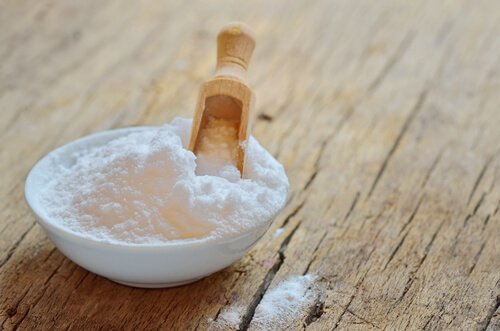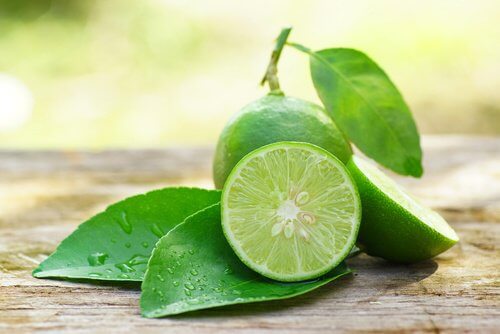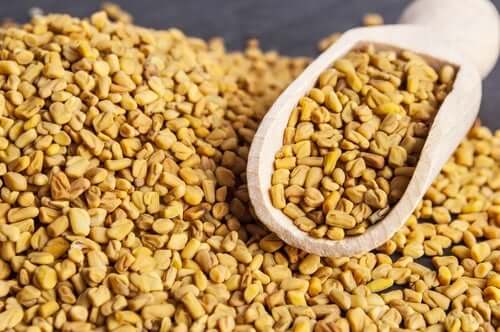The 9 Best Home Remedies for Bad Breath or Halitosis


Reviewed and approved by the doctor Gilberto Adaulfo Sánchez Abreu
Halitosis, or bad breath, is characterized by an unpleasant odor in the mouth, a condition that can cause a lot of discomfort. Because it’s embarrassing, it can cause those who suffer from it to lose their self-confidence and self-esteem among their circle of friends. Fortunately, there are many natural remedies for bad breath.
Bad breath is often caused by poor oral hygiene habits, but it can also be related to the consumption of certain foods, smoking, or having a dry mouth, as well as other factors. The remedies we’ll show you help to slow bacterial growth, neutralize the odor, and improve your oral health.
While commercially available mouthwashes can be very effective, today we’ll be sharing natural remedies for bad breath that are just as effective, and won’t break the bank!
Home remedies to freshen your breath
1. Baking soda

Ingredients
- 1 teaspoon of baking soda (5 g)
- 1/2 cup of warm water (100 ml)
How do you make it?
- Dilute the baking soda in a half a cup of warm water and then gargle the mixture two to three times a day.
Please read: 4 remedies with baking soda and lemon
2. Tea tree essential oil
Being a powerful antiseptic, tea tree essential oil is a natural disinfectant that fights the growth of bacteria in the mouth and controls bad breath. If you want to try tea tree oil, make sure you proceed with caution. Tea tree oil could cause irritation.
Ingredients
- 5 drops of tea tree essential oil
- 5 drops of mint oil
- 3 drops of lemon oil
- 1/2 cup of warm water (125 ml)
How do you make it?
- Mix all ingredients together and then gargle it twice a day
See also: Tea Tree Oil: the Amazing Oil that Provides Many Benefits
3. Parsley

Parsley contains a substance known as chlorophyll, which helps fight the symptoms of halitosis.
Ingredients
- 1 handful of parsley
- 1/2 cup of apple cider vinegar
How do you make it?
- Firstly, soak the parsley leaves in apple cider vinegar for 15 minutes.
- After that, chew them for a few minutes.
- Repeat this remedy after you brush your teeth.
4. Apple cider vinegar
Apple cider vinegar contains acetic acid, a substance that lowers the pH of the mouth, thus creating an unfriendly environment for microorganisms to proliferate.
Ingredients
- 3 tablespoons of apple cider vinegar
- 1 cup of water
How do you make it?
- Mix the apple cider vinegar and water together and then use it as a mouthwash.
5. Lime

Lime juice is one of the oldest remedies for bad breath. The citric acid stops the growth of bacteria on your tongue and gums.
Ingredients
- 1 lime
- 1 cup of water
How do you make it?
- Firstly, squeeze the lime juice into the cup of water and stir.
- Gargle with this liquid, several times a day.
6. Mint tea
Mint is excellent for reducing bad breath. It also has powerful antiseptic, anti-inflammatory, and antispasmodic properties.
Ingredients
- 1 handful of mint leaves
- 1 cup of water (250 ml)
How do you make it?
- Firstly, bring the cup of water to a boil and add the mint leaves. Then allow it to simmer for five minutes before straining the liquid. Drink this tea after every meal.
7. Nettle tea

Many people believe that nettle tea is a naturally cleansing beverage that stimulates the removal of toxins and heavy metals that could cause bad breath. However, there isn’t yet any scientific evidence to back up that claim.
That being said, you can incorporate nettle into your diet without any adverse effects.
Ingredients
- 1 tablespoon of nettles (10 g)
- 1 cup of water (250 ml)
How do you make it?
- Bring the cup of water to a boil, add the nettle, and then allow it to simmer for five minutes over a low heat.
- After that, remove it from heat, let it cool, and drink two cups of this tea a day.
8. Fennel
Fennel seeds are helpful when it comes to alleviating bad breath that’s caused by certain types of seasonings or a dry mouth.
Ingredients
- 1 tablespoon of fennel seeds (10 g)
How do you use it?
- Chew up a few fennel seeds after each meal
9. Fenugreek tea
Fenugreek has numerous health benefits, but there is no scientific evidence to confirm the benefits of fenugreek for people with halitosis. That being said, you can try it if you’d like.
Ingredients
- 1 teaspoon of fenugreek seeds (5 g)
- 1 cup of water (250 ml)
How do you make it?
- Firstly, bring the water to a boil and add the fenugreek seeds and simmer.
- Strain off the liquid and drink it twice a day.
In addition to trying any of these recipes for bad breath, remember to improve your oral hygiene by staying in good health and choosing the right toothbrush, toothpaste, and floss.
All cited sources were thoroughly reviewed by our team to ensure their quality, reliability, currency, and validity. The bibliography of this article was considered reliable and of academic or scientific accuracy.
- Abbasi, F., Khazaei, S., & Ahmadi-Motamayel, F. (2023). Evaluation of pharmaceutical use of chamomile in dentistry: A systematic review. Journal Of Craniomaxillofacial Research, 9(3), 1-8. https://jcr.tums.ac.ir/index.php/jcr/article/view/427
- Asaad, N., & Laflouf, M. (2022). Effectiveness of Apple Cider Vinegar and Mechanical Removal on Dental Plaque and Gingival Inflammation of Children With Cerebral Palsy. Cureus, 14(7), 1-8. https://www.ncbi.nlm.nih.gov/pmc/articles/PMC9375849/
- Ciancio S. G. (2017). Baking soda dentifrices and oral health. Journal of the American Dental Association (1939), 148(11S), S1-S3. https://jada.ada.org/article/S0002-8177(17)30822-X/fulltext
- Das, B., Rabalais, J., Kozan, P., Lu, T., Durali, N., Okamoto, K., McGeough, M. D., Lee, B. J., Barrett, K. E., Marchelletta, R., & Sivagnanam, M. (2022). The effect of a fennel seed extract on the STAT signaling and intestinal barrier function. PloS One, 17(7), 1-18. https://www.ncbi.nlm.nih.gov/pmc/articles/PMC9269469/
- Jesylne, P., Soundarajan, S., Murthykumar, K., & Meenakshi, M. (2016). The Role of Cardamom Oil in Oral Health: A Short Review. Research Journal of Pharmacy and Technology, 9, 272-274. https://rjptonline.org/HTMLPaper.aspx?Journal=Research%20Journal%20of%20Pharmacy%20and%20Technology;PID=2016-9-3-19
- Kato, Y., Otsubo, K., Furuya, R., Suemichi, Y., & Nagayama, C. (2018). Bacteriostatic Effect of Lemon Fruit Juice: It’s Potential as an Oral Rinsing Agent. Journal Of Oral Hygiene & Health, 6(02), 1-3. https://www.omicsonline.org/open-access/bacteriostatic-effect-of-lemon-fruit-juice-it8217s-potential-as-an-oral-rinsing-agent-2332-0702-1000243-103051.html
- Kim, Y. (2021). Analysis of the Effect of Daily Water Intake on Oral Health: Result from Seven Waves of a Population-Based Panel Study. Water, 13(19), 1-10. https://www.mdpi.com/2073-4441/13/19/2716
- Landeo-Villanueva, G. E., Salazar-Salvatierra, M. E., Ruiz-Quiroz, J. R., Zuta-Arriola, N., Jarama-Soto, B., Herrera-Calderon, O., Pari-Olarte, J. B., & Loyola-Gonzales, E. (2023). Inhibitory Activity of Essential Oils of Mentha spicata and Eucalyptus globulus on Biofilms of Streptococcus mutans in an In Vitro Model. Antibiotics, 12(2), 1-13. https://www.ncbi.nlm.nih.gov/pmc/articles/PMC9952483/
- Mahboubi M. (2018). Mentha spicata L. essential oil, phytochemistry and its effectiveness in flatulence. Journal of traditional and complementary medicine, 11(2), 75-81. https://www.ncbi.nlm.nih.gov/pmc/articles/PMC7936090/
- Ok, S., Jeong, S., & Lee, C. (2021b). Dehydration as an Etiologic Factor of Halitosis: A Case-Control Study. Journal Of Oral Medicine And Pain, 46(4), 117-124. https://www.journalomp.org/journal/view.html?doi=10.14476/jomp.2021.46.4.117
- Ripari, F., Cera, A., Freda, M., Zumbo, G., Zara, F., & Vozza, I. (2020). Tea Tree Oil versus Chlorhexidine Mouthwash in Treatment of Gingivitis: A Pilot Randomized, Double Blinded Clinical Trial. European Journal of Dentistry, 14(1), 55-62. https://www.ncbi.nlm.nih.gov/pmc/articles/PMC7069753/
- Valkenburg, C., Kashmour, Y., Dao, A., Fridus Van der Weijden, G. A., & Slot, D. E. (2019). The efficacy of baking soda dentifrice in controlling plaque and gingivitis: A systematic review. International Journal of Dental Hygiene, 17(2), 99-116. https://www.ncbi.nlm.nih.gov/pmc/articles/PMC6850485/
This text is provided for informational purposes only and does not replace consultation with a professional. If in doubt, consult your specialist.








